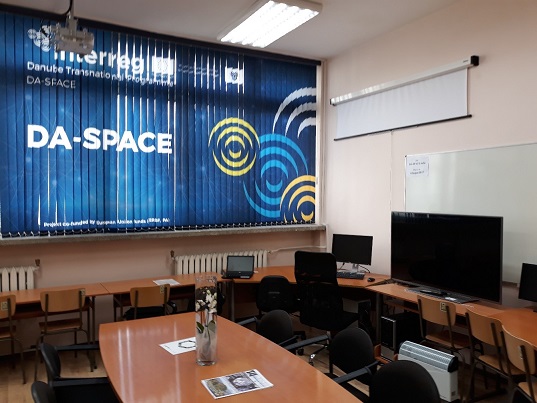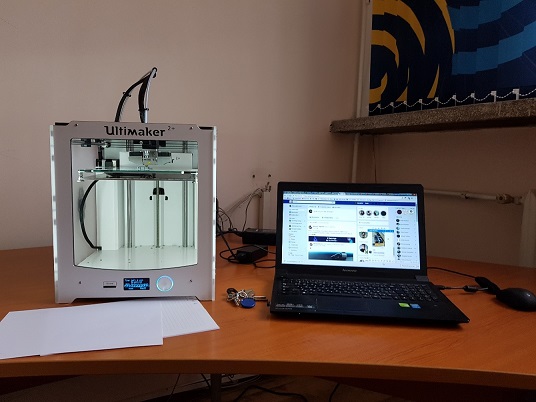DA-SPACE - TUS FACULTY OF MECHANICAL ENGINEERING CREATE LABORATORY FOR OPEN INNOVATION
26-03-2018
Under the European project "Open Innovation for Enhancing Entrepreneurial Skills and Public-Private Partnership in the Danube Region" (DA-SPACE), the "Laboratory for Open Innovation" started its operation at the Faculty of Mechanical Engineering of the Technical University of Sofia (TUS). The goal is to connect good ideas of young innovators and the creation of sustainable businesses. With the establishment of the laboratory project DA-SPACE meets the challenges of the Danube region to help small and medium enterprises, reduce unemployment, stimulate entrepreneurship and creative potential of talented young people. The pilot phase of the project consists of two cycles of activities in each of the seven countries participating in the project, with an expected total score of 100 completed projects. Each laboratory cycle will last for five months. Once launched, it will work in parallel in all 7 countries, which will allow transnational participation. The outcome of the pilot phase will be used to identify the transnational strategy to support innovation and entrepreneurship.

The concept of “open innovation” introduced by Henry Chezbrou means a paradigm in which companies can use both internal and external ideas and internal and external market pathways to improve their technology.
The DA-SPACE Lab is the physical space in which companies, public and civic organizations and universities will work together with young talents on challenges in the Danube region to generate new solutions and create entrepreneurial skills for the benefit of the Danube region as a whole. The DA-SPACE network consists of 7 open innovation labs in: Ulm, Germany; "Dunărea de Jos" University of Galati, Romania; Czech Technical University in Prague; Institute of Management, Slovak University of Technology in Bratislava; Juraj Dobrila, University of Pula, Croatia; Technical University of Sofia, Bulgaria and University of Novi Sad, Serbia.

Inside the Open Innovation Lab
Target groups, depending on the role they play in the process of open innovation, are defined as consumers of innovation (seekers) and innovation generators (solvers). Innovation consumers (seekers) are small and medium-sized enterprises, public administration, business support organizations defining business challenges to be addressed and solved in the DA-SPACE Lab. They can provoke their challenge in any of the DA-SPACE labs. Innovation generators (solvers) are students and young talents who are interested in participating in solving one of the open challenges and applying for participation in one of the DA-SPACE labs. They will work in a team on a particular challenge within the lab and will benefit from the Entrepreneurship Training Program offered by the DA-SPACE project. This program will support the entrepreneurial skills of local stakeholders.
The pilot program for a regional DA-SPACE Lab includes the following activities:
- Identifying of potential consumers of innovation (seekers);
- Defining challenges;
- Promoting challenges;
- Announcement for stakeholders;
- Establishing a link between young talent - innovation generators and challenges;
- Facilitate the process of co-innovation.
Along with participating in the lab, young talents will be able to improve their entrepreneurial skills by participating in regional training organized by each project partner. The training will be carried out locally and will consist of theory and practice that will apply to different stages in the development of innovative idea, as well as the development of an innovative solution within the laboratory. The different training modules will be conducted by DA-SPACE's internal staff and/or experts from both the business and the academic community and can be conducted in different formats such as training seminars, teaching, weekly lectures, webinars, etc. Each laboratory can invite and include experts from other regions.
Expected results
Each team participating in the laboratory should provide at least one of the following expected results in user-agreed innovations:
- project plan;
- monthly progress reports;
- results (demo and contract product with relevant documentation);
- depending on the design theme or method used for project management: conceptual design document, usability documentation (for example, usability analysis, user interface specification, usability test report, etc.) or technical documentation;
- final report.
The results of the teams' work at each of the seven laboratories working within the project will be presented and evaluated locally during the so-called Local Demo Day.
